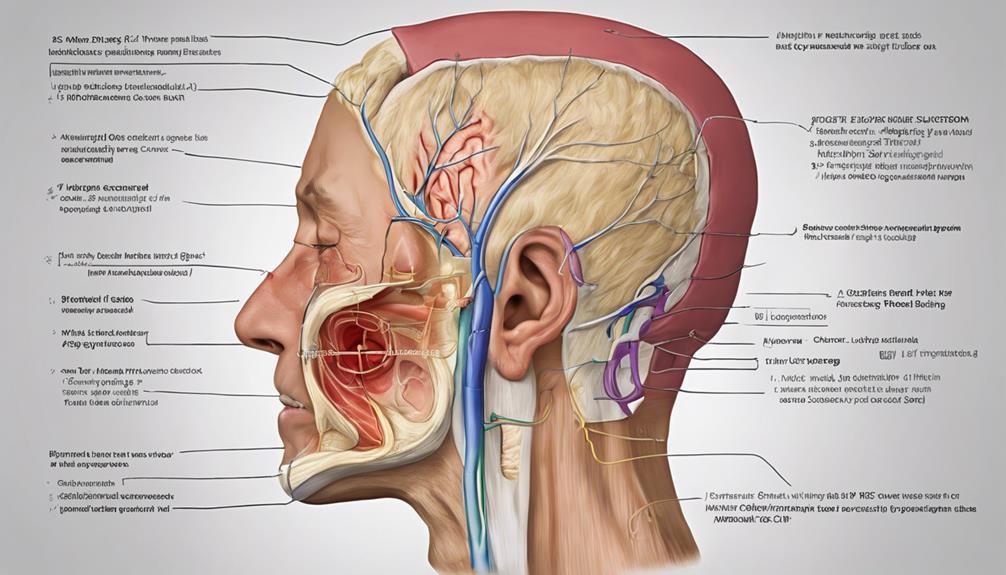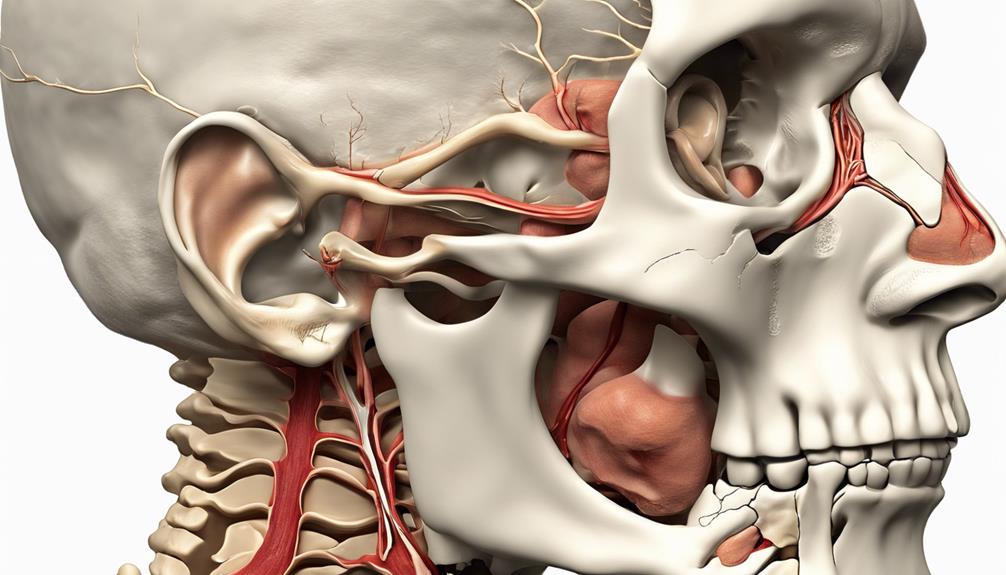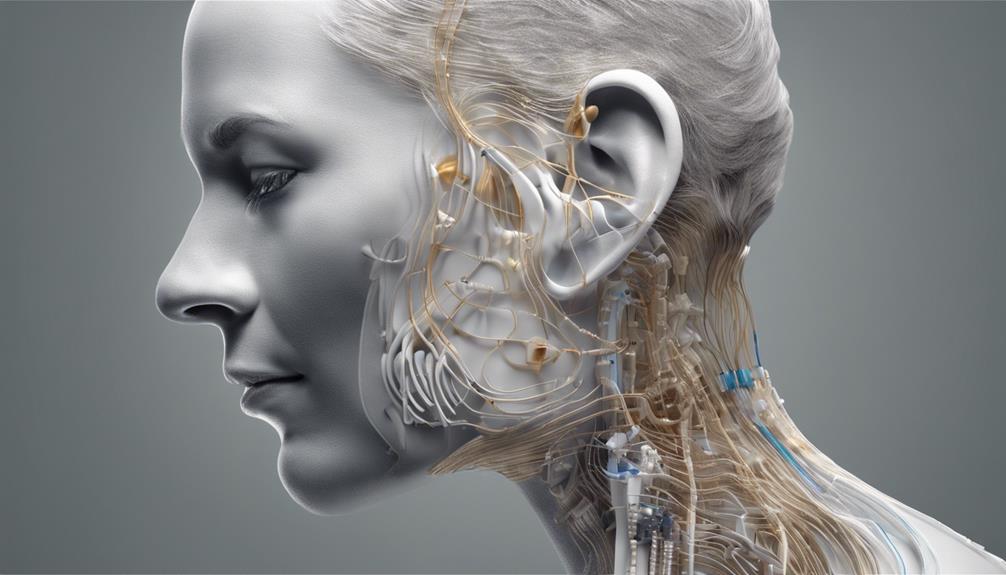We have all experienced the discomfort of sinus pressure during a cold or allergy season, but did you know that it can also impact our hearing?
The intricate connection between sinuses and our auditory system reveals surprising ways in which sinus issues can lead to hearing loss.
From nasal congestion affecting sound transmission to sinus blockages causing temporary deafness, the effects can be more profound than we realize.
Understanding these 10 ways sinuses can influence our hearing health may shed light on the importance of addressing sinus problems promptly to safeguard our hearing abilities.
Key Takeaways
- Sinus conditions disrupt Eustachian tube function, affecting sound transmission and causing hearing difficulties.
- Allergic reactions lead to inflammation and swelling in sinuses, impacting sound conduction and hearing health.
- Eustachian tube dysfunction causes pressure imbalances, increasing the risk of middle ear issues and hearing impairment.
- Inflammation in sinuses blocks the Eustachian tube, leading to ear pressure, pain, and potential hearing loss.
Nasal Congestion and Hearing Impairment
Nasal congestion stemming from sinusitis can significantly impact hearing by disrupting the function of the Eustachian tube, leading to temporary hearing loss. The Eustachian tube plays a crucial role in equalizing pressure in the middle ear. When this tube becomes blocked due to sinus inflammation, it can result in fluid accumulation in the middle ear, affecting sound conduction and causing hearing impairment.
Pressure imbalances created by sinus-related nasal congestion can also interfere with the normal functioning of the ossicles and cochlea in the middle ear, contributing to hearing difficulties. Additionally, prolonged nasal congestion from sinus infections can worsen otitis media, an ear infection that can further compromise hearing until the infection resolves.
Consequently, sinusitis-induced nasal congestion can indirectly impact hearing by disturbing the usual air pressure regulation in the middle ear, resulting in muffled sounds and potential hearing issues. Understanding these connections between sinusitis, Eustachian tube dysfunction, and temporary hearing loss is essential for managing sinus-related hearing impairments effectively.
Sinus Pressure Affecting Ear Function
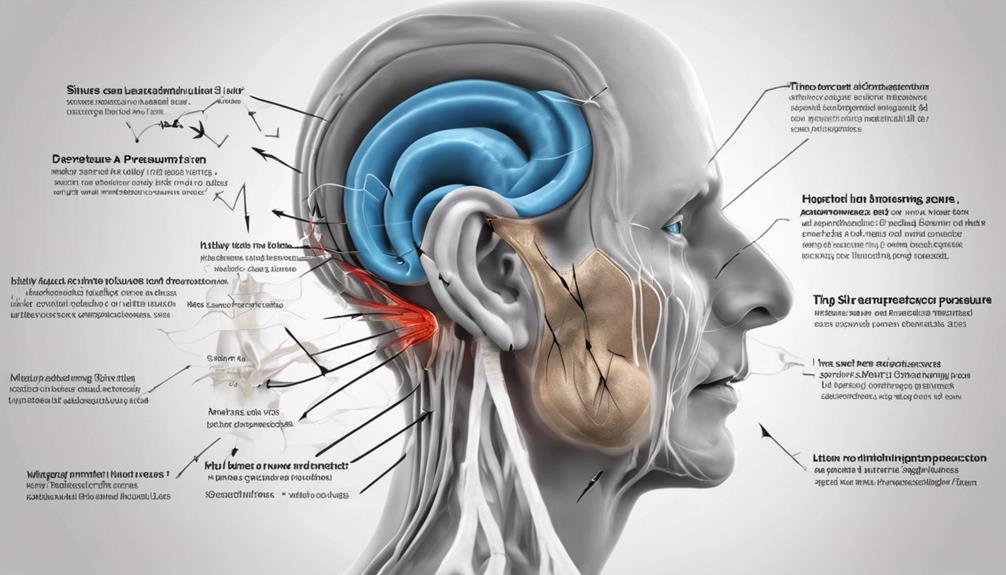
Sinus pressure can intricately affect ear function, manifesting as discomfort and pressure due to the blockage of the Eustachian tube. When sinus pressure interferes with the Eustachian tube, several issues can arise, impacting ear function:
- Ear Congestion: The blockage of the Eustachian tube can lead to a feeling of fullness or congestion in the ear.
- Hearing Difficulties: Sinus pressure can disrupt the normal transmission of sound waves, resulting in difficulties with hearing.
- Muffled Hearing: The connection between the sinuses and ears can cause sounds to be muffled or unclear.
- Ear Fullness: Swelling in the sinuses can extend to the ears, causing a sensation of fullness that affects hearing.
Understanding how sinus pressure affects the Eustachian tube and subsequently ear function is crucial in managing symptoms like ear congestion, hearing difficulties, muffled hearing, and ear fullness.
Inflammation Leading to Auditory Issues
When sinuses become inflamed, it triggers a cascade of events that can impact our ability to hear.
The inflammatory response mechanism can lead to blockages in the Eustachian tube, affecting sound transmission to the inner ear.
Understanding the impact of inflammation on ear health is crucial in exploring the treatment options available for managing auditory issues.
Inflammatory Response Mechanism
During an inflammatory response in the sinuses, the resulting swelling and blockage of the Eustachian tube can significantly impact middle ear function. This chain of events can lead to various auditory issues due to the intricate connections between the sinuses and the ears.
When inflammation occurs in the sinuses, it can cause pressure changes in the ear, interfering with sound transmission and possibly resulting in temporary hearing problems. Additionally, the inflammation from sinusitis may trigger the accumulation of fluid in the ear, affecting the accurate perception of sound.
The disruption of the normal air pressure balance in the middle ear caused by the inflammatory process in the sinuses can further contribute to difficulties in hearing.
Impact on Ear Health
In cases of sinus inflammation impacting ear health, the resulting fluid buildup in the middle ear can disrupt sound conduction and lead to temporary hearing loss. Sinusitis can trigger middle ear infections by affecting the Eustachian tube, which regulates pressure in the ear. This disruption can cause ear pressure, discomfort, and potentially contribute to sensorineural hearing loss.
The interconnected nature of the ears and sinuses underscores how sinusitis can indirectly affect hearing by impeding proper ear function. Understanding the mechanisms through which sinus inflammation influences the Eustachian tube and middle ear is crucial for recognizing the potential impact on auditory health.
It's essential to address sinus issues promptly to mitigate the risk of complications that could affect hearing.
Treatment Options Available
Addressing sinus-induced hearing loss involves implementing targeted treatment strategies to alleviate inflammation and restore auditory function effectively. When dealing with sinus-related auditory symptoms, it's crucial to consider various treatment options:
- Medications: Utilize decongestants and antihistamines to reduce sinus inflammation and restore normal Eustachian tube function.
- Nasal Irrigation: Clear the sinuses with saline solutions to alleviate pressure on the Eustachian tube and improve auditory symptoms.
- Steroid Nasal Sprays: These can help reduce inflammation in the sinuses, which may positively impact auditory functions.
- Surgical Intervention: In severe cases or when conservative treatments fail, surgery may be necessary to address underlying sinus issues affecting hearing.
Eustachian Tube Dysfunction and Hearing Loss
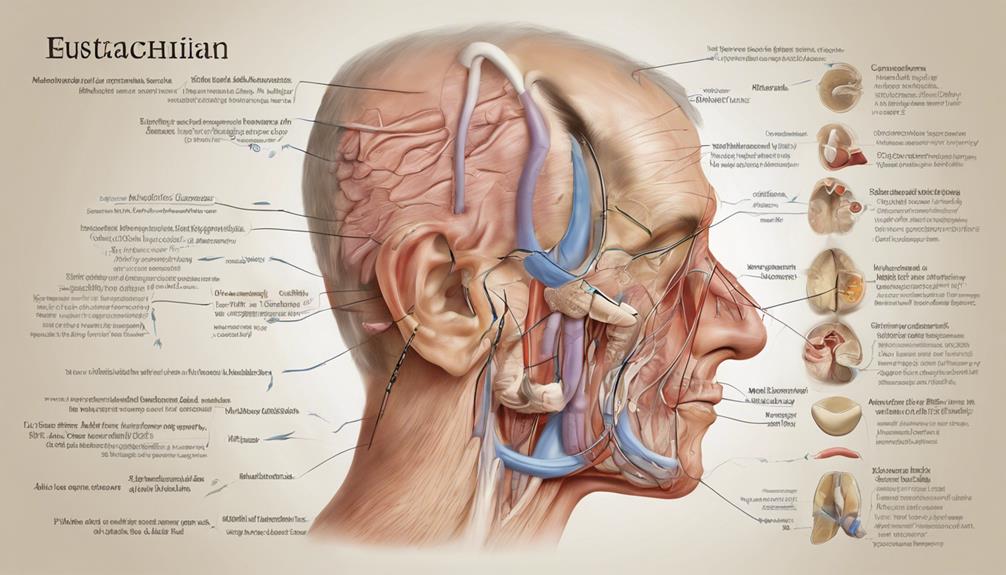
When considering the connection between Eustachian tube dysfunction and hearing loss, it's essential to understand how this dysfunction can disrupt the middle ear's pressure regulation mechanism. Inflammation from sinus issues can lead to blockages or swelling in the Eustachian tube, causing fluid accumulation and affecting sound transmission.
Addressing these issues promptly is crucial in managing symptoms like ear fullness and muffled hearing associated with Eustachian tube dysfunction.
Eustachian Tube Functionality
To ensure optimal auditory function, understanding the impact of Eustachian tube dysfunction caused by sinus issues on hearing loss is imperative. Sinus inflammation can lead to swelling of the Eustachian tube, disrupting pressure regulation in the middle ear. This dysfunction can result in fluid accumulation, causing hearing difficulties. Moreover, impaired Eustachian tube function in sinusitis may create a vacuum effect in the middle ear, affecting sound transmission and leading to hearing issues.
- Sinus inflammation can cause Eustachian tube swelling
- Disrupts pressure regulation in the middle ear
- Results in fluid buildup and hearing difficulties
- Creates a vacuum effect, impacting sound transmission
Hearing Impairment Connection
Eustachian tube dysfunction resulting from sinus issues can significantly contribute to hearing loss by obstructing the transmission of sound to the middle ear. When sinuses become inflamed or swollen, pressure changes can affect the Eustachian tube, leading to hearing impairment. Sinus infections are known to cause fluid accumulation in the middle ear, resulting in conductive hearing loss.
This link between sinus conditions and hearing issues often revolves around problems with Eustachian tube function. The intricate relationship between the ears and sinuses means that sinus inflammation can disrupt Eustachian tube functionality, subsequently impacting hearing abilities. Understanding these connections is crucial in addressing hearing loss associated with sinus problems and emphasizes the importance of managing sinus health to preserve optimal hearing function.
Sinus Infections Triggering Hearing Problems
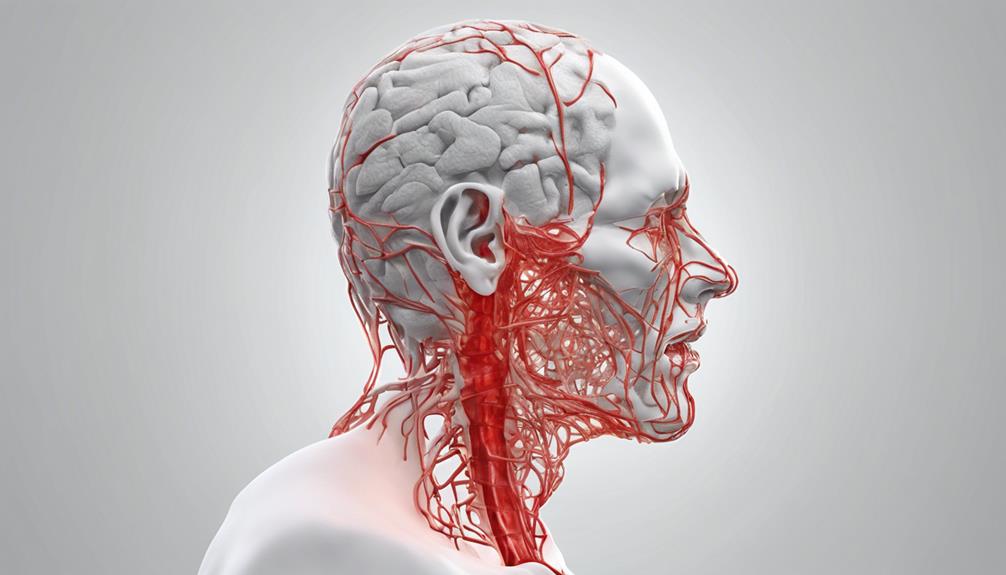
A sinus infection can act as a trigger for hearing problems by causing fluid buildup in the middle ear, potentially leading to temporary hearing loss. When sinus infections cause hearing issues, it can manifest in several ways:
- The swelling and inflammation in the sinuses can disrupt the Eustachian tube function, affecting pressure equalization in the ears.
- Sinus infections may result in ear pressure, discomfort, and even otitis media, which can impact hearing function.
- Temporary tinnitus and hearing loss can occur due to congestion and pressure affecting sound transmission.
- Severe cases of sinus infections can potentially lead to permanent hearing loss, highlighting the importance of timely treatment and management.
Understanding how sinusitis can cause hearing problems helps in recognizing the signs early to prevent hearing loss. Regular monitoring and prompt intervention are essential in mitigating the impact of sinus infections on hearing abilities.
Allergic Reactions Impacting Hearing Abilities
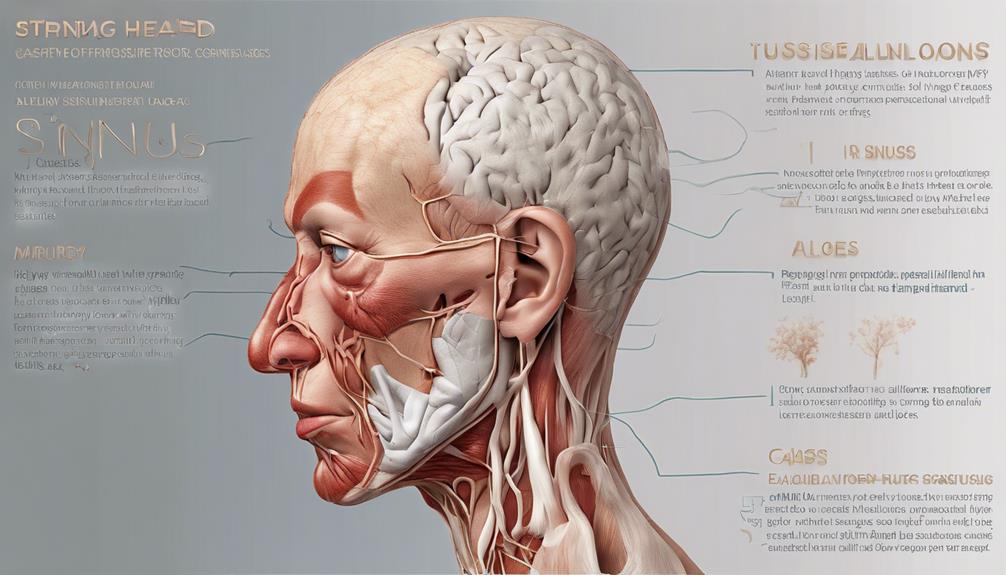
When allergies trigger reactions in the sinuses, they can lead to inflammation and swelling, impacting the Eustachian tube and potentially causing hearing loss.
The increased mucus production from allergies can block the middle ear, affecting sound wave transmission and causing temporary hearing issues.
Inflammatory responses from allergic reactions can disrupt the normal functioning of ear structures, contributing to hearing difficulties in individuals with sinus problems.
Allergies and Hearing Loss
Allergic reactions impacting hearing abilities can result from inflammation in the sinuses caused by allergies, potentially leading to temporary or persistent hearing impairment. When allergies come into play, the intricate mechanisms within our ears may face disruptions.
- Eustachian Tube Blockages: Inflammation from allergies can cause the Eustachian tube to become blocked, affecting equalization of pressure and sound transmission.
- Mucus Buildup: Increased mucus production due to allergies can lead to fluid accumulation in the ears, impacting how sound travels.
- Sinus Infections: Allergies can trigger sinus infections, worsening ear-related symptoms like pressure and muffled hearing.
- Histamine Effects: Histamine release in response to allergens can result in nasal and sinus swelling, indirectly influencing hearing function.
Sinus Congestion Effects
In considering the impact of sinus congestion on hearing abilities, it is crucial to recognize the intricate connection between allergic reactions and disruptions in the delicate mechanisms of the ear. Allergic reactions causing sinus congestion can lead to Eustachian tube dysfunction, affecting the middle ear and impacting sound transmission. The swelling in the sinuses due to allergies can increase pressure on the ear structures, resulting in hearing difficulties. Inflammation in the nasal passages can extend to the Eustachian tube, causing blockages and further affecting the middle ear. The allergic sinus congestion triggers a chain reaction, disturbing the normal balance of pressure in the ear and causing temporary hearing issues. The disruption in the middle ear function from sinus congestion can lead to a temporary decrease in hearing acuity.
| Eustachian Tube Dysfunction | Middle Ear | Hearing Difficulties | Sinus Congestion |
|---|---|---|---|
| Allergic reactions can cause dysfunction | Impact on the ear | Result in hearing issues | Leads to sound transmission issues |
Inflammation and Hearing Impairment
Considering the intricate relationship between sinus inflammation and hearing impairment, it's essential to understand how allergic reactions impact the delicate structures of the ear, potentially leading to temporary or permanent auditory issues.
- Allergic reactions can cause swelling in the Eustachian tube, resulting in ear pressure.
- Inflammation triggered by sinus allergies can lead to pain in the ears.
- Sinus infections can contribute to hearing loss by affecting the transmission of sound signals.
- Chronic sinusitis may result in prolonged exposure of the ear to inflammatory mediators, potentially causing permanent damage to auditory function.
Sinus Blockages Causing Temporary Deafness
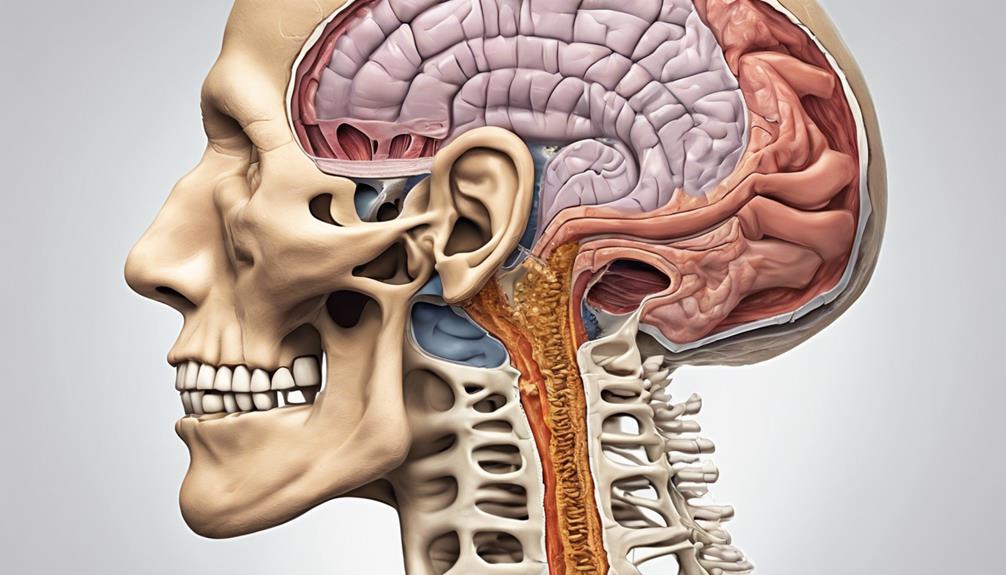
When sinus blockages occur, they can temporarily impair hearing by affecting the Eustachian tube that connects the middle ear to the back of the nose. Sinus issues like inflammation and swelling can lead to the obstruction of the Eustachian tube, causing pressure imbalances in the ear and resulting in temporary deafness. This disruption in the normal process of equalizing pressure within the ear can cause hearing disturbances until the sinus blockage is resolved. Additionally, sinus infections can contribute to fluid buildup in the middle ear, further impacting hearing acuity until the infection subsides and proper drainage is restored.
| Eustachian Tube | Sinus Blockages | Temporary Deafness |
|---|---|---|
| Connects middle ear | Obstruct Eustachian tube | Impairs hearing temporarily |
| Equalizes ear pressure | Causes pressure imbalances | Reversible with treatment |
Understanding the relationship between sinus blockages and temporary deafness is crucial in managing hearing issues associated with sinus problems effectively.
Sinus-Related Tinnitus and Hearing Disturbances
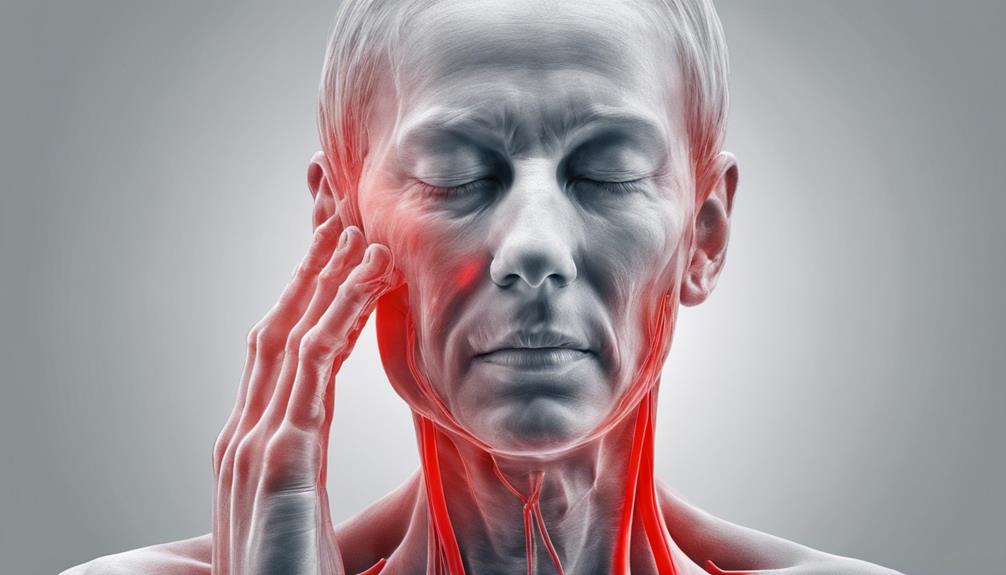
How do sinus-related tinnitus and hearing disturbances impact individuals experiencing sinusitis? When sinusitis strikes, it can bring along a host of unwelcome aural symptoms that disrupt the delicate mechanisms of hearing. Here's how it affects us:
- Tinnitus Variations: Sinus-related tinnitus may introduce a symphony of ringing, buzzing, or humming sounds that invade the ears, creating a cacophony of auditory disturbance.
- Ear Pressure: Fluid accumulation in the middle ear due to sinus infections can lead to uncomfortable ear pressure, affecting hearing abilities and causing discomfort.
- Eustachian Tube Swelling: Swollen Eustachian tubes, often a consequence of sinusitis, can hinder sound conduction, leading to a muffled or unclear auditory experience.
- Inner Ear Imbalances: The pressure imbalances created by sinus infections can extend to the inner ear, causing disruptions that manifest as auditory disturbances, further complicating the hearing process.
Sinus-related tinnitus and hearing disturbances paint a vivid picture of the challenges faced by those battling sinusitis, highlighting the intricate interconnectedness of the ear and sinus systems.
Sinus Surgery Complications and Hearing Impairments
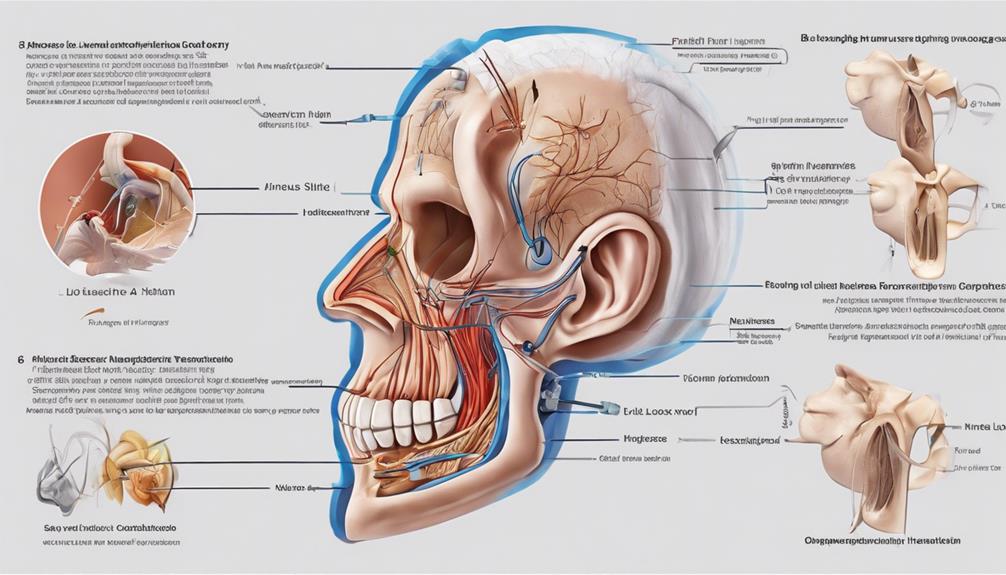
Sinus surgery complications have the potential to result in hearing impairments for certain individuals. Issues such as damage to the inner ear structures during surgery may impact auditory function. Complications like inflammation, scarring, or nerve damage post-surgery can also affect hearing. To prevent or address hearing loss, meticulous post-operative monitoring is crucial. If changes in hearing or hearing issues arise after sinus surgery, consultation with an ENT specialist is essential for proper evaluation and management.
—
| Sinus Surgery Complications | Impact on Hearing | Management |
|---|---|---|
| Damage to inner ear structures | Decreased auditory function | Close post-operative monitoring |
| Inflammation post-surgery | Hearing impairments | Prompt consultation with an ENT specialist |
| Scarring complications | Altered sound perception | Hearing tests to assess the extent of damage |
| Nerve damage implications | Tinnitus development | Rehabilitation options for hearing loss |
| Surgical-site infections | Balance issues | Potential need for corrective surgical actions |
—
Chronic Sinus Issues Worsening Hearing Health
Chronic sinus issues exacerbate concerns regarding deteriorating hearing health by impacting the Eustachian tube and potentially leading to hearing loss due to inflammation in the nasal cavity and sinuses. When sinusitis persists, it can trigger infection that spreads to the middle ear, disrupting the transmission of sound waves and causing auditory challenges. Studies have linked the severity of chronic rhinosinusitis (CRS) with sensorineural hearing loss, underscoring the significance of addressing sinus problems for overall ear well-being.
- Infection spreading from sinuses to the middle ear
- Disruption of sound wave transmission
- Correlation between CRS severity and hearing impairment
- Increased rates of hearing loss, especially in high-frequency range
Frequently Asked Questions
Can Sinus Problems Cause Loss of Hearing?
Yes, sinus problems can cause loss of hearing. When sinus issues arise, they can impact sound transmission to the inner ear, leading to temporary or even permanent hearing loss.
Inflammation and swelling in the sinuses can affect the Eustachian tube, causing pressure changes in the middle ear that disrupt hearing ability.
Prompt treatment of sinus problems is crucial to prevent long-term effects on hearing and address any associated hearing loss effectively.
How Do You Relieve Sinus Pressure in Your Ears?
To relieve sinus pressure in our ears, we can use saline nasal sprays to clear mucus and reduce pressure.
Applying warm compresses to our face can alleviate congestion.
Nasal decongestants can shrink swollen passages and ease pressure.
Gentle head and neck exercises promote drainage.
Avoiding irritants like smoke helps prevent congestion.
These methods are effective in managing sinus pressure and promoting ear health.
How Do You Unclog Your Ears From Congestion?
When facing ear congestion, we can take steps to unclog them effectively. Techniques like warm compresses, nasal decongestants, gum chewing, and the Valsalva maneuver can all aid in relieving pressure and promoting drainage.
Steam inhalation or hot showers can also help loosen mucus and clear blockages.
How Can I Get My Hearing Back From Sinuses?
We can help you regain your hearing affected by sinus issues by promptly treating sinus infections and addressing inflammation and congestion.
Seeking medical advice for persistent symptoms is crucial. Proper management of sinus-related ear symptoms through medications and treatments can alleviate ear pressure and improve hearing.
Addressing underlying sinus problems can significantly enhance ear function and restore lost hearing abilities.
Conclusion
Just as a tangled web can ensnare its prey, sinus issues can ensnare our hearing health.
From nasal congestion to Eustachian tube dysfunction, the connection between sinuses and hearing loss is intricate and impactful.
By understanding the ways sinuses can cause hearing impairment, we can navigate through the maze of symptoms and seek timely intervention.
Stay vigilant, for in the labyrinth of sinus-related hearing issues, knowledge is our guiding light.

